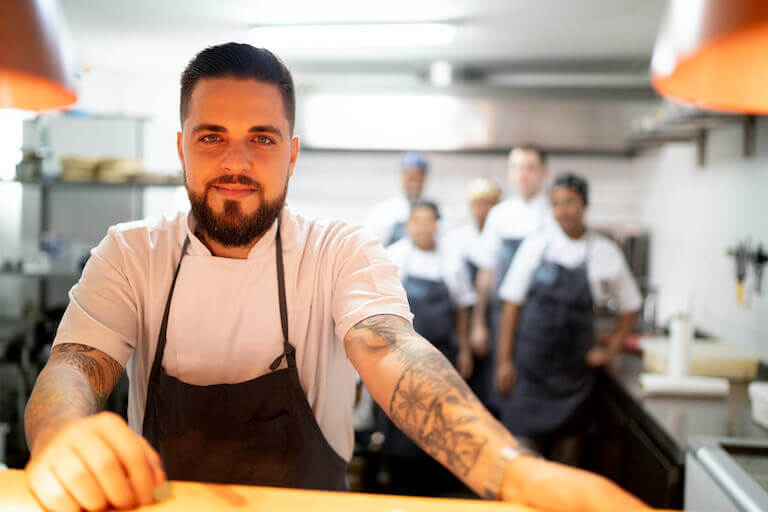Most jobs have their ups and downs, and working as a chef is no exception; the thrill of honing your craft, building lasting relationships, and creating dishes you’re proud of can often go hand in hand with long hours and stressful kitchens.
No matter how happy you are in your current position, it’s natural to think about looking for a new job in the industry. But leaving one job for another can be a difficult decision—how can you be sure you’re doing the right thing?
Let’s take a look at some tips for putting that question in perspective—and, if you decide that switching jobs is the right thing to do, for leaving your current one in a way that is considerate and professional.
1. Take Stock of Your Situation
For many chefs, cooking is a passion—and working in a professional kitchen can feel like a privilege. But this feeling can create inertia, and may make some chefs feel it’s better to stick it out at their current job rather than risk losing their place in the industry they love by trying to find a new one.
Leaving a job you’re familiar with certainly can feel like a risk—but it can also open up new opportunities that may not have been available otherwise. And the restaurant industry is no stranger to turnover, with the U.S. Department of Labor Statistics finding it consistently outpaces other industries. So if you find yourself more than casually wondering, “Should I change jobs?”, it may be worth taking the time to think seriously about whether your current role is right for you.

When a chef takes stock of their situation, they may be able to uncover new opportunities.
2. What Are Your Culinary Dreams?
When it comes to work, we all have certain fundamental dreams, goals, and aspirations. You may aspire to support your family, work your way up to a certain role in the kitchen, or even start your own business. When evaluating your current job, it can be helpful to step back and think about your culinary dreams.
If you haven’t already set clear goals for your career, this can be a great opportunity to do that. And even if you’ve established goals in the past, this could be a good time to revisit them. Goals can shift over time, and it’s important to reevaluate them periodically as your needs change—or as you achieve certain goals you’ve previously set.
If you’re a new chef, ‘becoming a professional chef’ may have been a goal; if you’ve been in the industry longer, you may have already fulfilled certain aspirations, like working at a specific restaurant or in a certain position. No matter where you are in your career, staying in touch with your dreams can be a good way to keep your career choices in perspective.

Chefs may want to check in on their goals from time to time, to make sure they’re working toward their dreams.
3. Is Your Job Helping You Achieve Your Dreams?
The routine of work can make it all too easy to focus on the day-to-day demands of your job and lose sight of the bigger picture. Once you’ve established your goals, though, it can become easier to see whether or not your current job is helping you get from where you are now to where you want to be.
Think about what your current job has to offer you. Are you learning from your colleagues? Are there opportunities to advance to a more senior position, or to move to a different position where you can develop new skills? Keep in mind that your career can unfold over many years, and not every job you have will be perfect. But, ideally, every place you work can help you gain experience and build connections that can help you get closer to fulfilling your culinary aspirations.
However, if you feel that you’ve plateaued in your current position, that could be a sign that you should consider looking into options that can help you continue to develop your skills—like looking for a new restaurant job, or even pursuing a culinary education.
If you feel you still have room to grow at your current job but are unhappy there for other reasons, it may be worth probing into exactly why you feel that way before you decide to move on. For example, if you’re finding your routine unsustainable, you may be able to make some changes in order to achieve a better work-life balance. Sometimes speaking with your employer or a senior chef may be all that’s necessary to improve the situation.

Communicating with other chefs can help eliminate obstacles to your success.
That said, if a situation really isn’t working for you, think about whether its potential benefits are worth your actual time and energy. At the end of the day, let your dreams be your guide—you may find it easier to cut through the noise and determine whether you may still be able to gain valuable experience at your current job, or whether it may be better to move on.
If You Leave, Do It the Right Way
In a certain sense, the way you leave a job is as important as the decision to leave in the first place. That’s because it can shape your reputation in the industry—the restaurant community is tight-knit, and the way you handle this transition could impact your ability to get recommendations or learn about opportunities.
So if, after reflecting on your situation, you’ve decided that making a move is the best thing for you, be aware of the importance of doing so responsibly—not only because it’s the right thing to do, but because it can affect your future prospects.
Be Respectful and Honest
If you haven’t spoken with your employer or a senior chef about your career goals already, consider doing so If you keep your motivations to yourself, your colleagues may not understand your decisions and may not be able to recommend you as highly in the future; if you’re respectful, honest, and open, they may be better able to speak to your integrity and ambition. And it’s even possible that, once your bosses understand your goals, they could begin transforming the workplace into a place where you can grow and prosper without having to leave. And if you still wish to move on, they may help you by referring you for a position or putting you in touch with one of their industry connections.

Being respectful of and honest with your coworkers can leave a lasting positive impression.
Give Plenty of Notice
Give your employer as much notice as possible once you’ve made your decision. This gives them the opportunity to figure out how to handle your departure and start looking for a replacement. While what happens at a restaurant after you leave isn’t your responsibility, recognize that, no matter your role, it will take time for your former workplace to adapt—and the higher your position, the more time will likely be necessary.
Your employer will appreciate the notice in taking that next step in your career.
Is there a minimum amount of time you should stay at a job?
While you shouldn’t force yourself to stay in a situation that’s truly untenable, there are advantages to sticking with a job for at least a year. This can show future employers that you’re dedicated, and that it’s worth hiring and training you. Leaving a less-than-ideal job may feel like the right thing to do in the moment, but future employers may be skeptical if your resume is full of short tenures.
Stick It Out Until the End
Even if you’re starting at a new restaurant soon, for as long as you’re at your current job, that is your job. Take it seriously and stay committed, right up to your last day. Not only will this show your employer and colleagues that you respect them, it can also have a positive impact on their impression of you. If you ever need to ask for a reference, it’s best that you gave 100% right up to the end.
Take the Next Step on Your Culinary Path
A job can be so much more than a paycheck—it can be an opportunity to continue to develop your skills and, step-by-step, to get closer to where you want to be.
Staying connected to your culinary dreams can help you monitor whether you’re on the right track or may want to make a change, whether that be seeking a new job or pursuing some other opportunity to develop your career, like attending culinary school.
An education at Escoffier can expose you to fundamental culinary techniques and business skills that could help you take your career to the next level. With programs available at our campuses in Boulder and Austin as well as online, you can find an option that’s right for you.
Financial aid, grants, and scholarships are available to those who apply and qualify, so reach out to us today!
INTERESTED IN LEARNING MORE ABOUT CULINARY CAREERS? CHECK OUT THESE ARTICLES NEXT!
- What Can You Learn from a Culinary School Externship?
- Inside a Chef’s Mind: The Process Behind Creating New Dishes
- How to Earn a Culinary Degree from Home
*Information may not reflect every student’s experience. Results and outcomes may be based on several factors, such as geographical region or previous experience.





